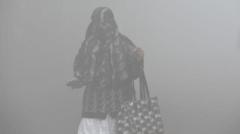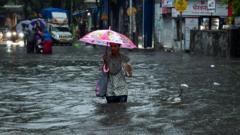The persistent air quality crisis in Delhi has forced families with the means to relocate, like Saurabh Bhasin, to seek cleaner environments. While some can temporarily escape, the majority remain trapped in the city's toxic air, highlighting a deepening public health emergency.
Families Escape Delhi's Toxic Smog in Search of Clean Air

Families Escape Delhi's Toxic Smog in Search of Clean Air
As air pollution in Delhi reaches hazardous levels, some families like Saurabh Bhasin's are fleeing to coastal areas to protect their health.
As hazardous smog blankets Delhi every winter, a growing number of families are choosing to flee the capital in search of cleaner air. Saurabh Bhasin, once a devoted Delhi resident, made the difficult decision to leave for Goa with his wife and daughter after her asthma diagnosis became a grim reality of life in the city. Mr. Bhasin has often raised his voice against the deteriorating air quality and even petitioned the Supreme Court regarding the health risks of pollution caused by traffic, construction, and festive firecrackers.
The struggles of the Bhasin family are echoed by many others in Delhi who feel increasingly constrained by relentless air quality deterioration. For the rich, moving away is sometimes an option, frequently leading families to retreat temporarily to picturesque regions in search of respite, while the majority of residents feel trapped by socioeconomic factors that limit their choices.
One woman, Rekha Mathur, relocates yearly to Dehradun to shield her newborn from the unrelenting pollution. However, she is forced to adapt to a life divided from her husband, who remains in Delhi for work. She expresses uncertainty about their future, highlighting how the growing crisis now extends beyond urban hubs, affecting once-cleansed locales too.
Despite measures such as construction restrictions and vehicle regulations attempted by authorities, the city still suffers from air quality issues deemed hazardous by the World Health Organization. Public dialogue surrounding pollution has become a yearly norm, but real changes remain elusive, perpetuating the ongoing struggle for clean air.
Journalist Om Thanvi, spurred by personal health concerns, chose to permanently relocate to Rajasthan. He acknowledges the cultural vibrancy of Delhi but finds solace in his newfound health, urging those who can afford to leave to consider similar paths.
For individuals like Sarita Devi, the reality is far bleaker. Bound by economic necessity, she cannot afford to escape the smog and works diligently outdoors. Her perspective highlights the stark inequality pandemic; for many, the cost of air quality is not just a health concern but a fundamental economic crisis.
In a city where summer's oppressive heat used to be the only worry, families like the Bhasins now grapple with the heavy toll of air pollution on health. They express a resolved commitment to prioritize their wellbeing, believing that they are no longer willing to pay the price for living in a city where the air quality threatens their lives.
The struggles of the Bhasin family are echoed by many others in Delhi who feel increasingly constrained by relentless air quality deterioration. For the rich, moving away is sometimes an option, frequently leading families to retreat temporarily to picturesque regions in search of respite, while the majority of residents feel trapped by socioeconomic factors that limit their choices.
One woman, Rekha Mathur, relocates yearly to Dehradun to shield her newborn from the unrelenting pollution. However, she is forced to adapt to a life divided from her husband, who remains in Delhi for work. She expresses uncertainty about their future, highlighting how the growing crisis now extends beyond urban hubs, affecting once-cleansed locales too.
Despite measures such as construction restrictions and vehicle regulations attempted by authorities, the city still suffers from air quality issues deemed hazardous by the World Health Organization. Public dialogue surrounding pollution has become a yearly norm, but real changes remain elusive, perpetuating the ongoing struggle for clean air.
Journalist Om Thanvi, spurred by personal health concerns, chose to permanently relocate to Rajasthan. He acknowledges the cultural vibrancy of Delhi but finds solace in his newfound health, urging those who can afford to leave to consider similar paths.
For individuals like Sarita Devi, the reality is far bleaker. Bound by economic necessity, she cannot afford to escape the smog and works diligently outdoors. Her perspective highlights the stark inequality pandemic; for many, the cost of air quality is not just a health concern but a fundamental economic crisis.
In a city where summer's oppressive heat used to be the only worry, families like the Bhasins now grapple with the heavy toll of air pollution on health. They express a resolved commitment to prioritize their wellbeing, believing that they are no longer willing to pay the price for living in a city where the air quality threatens their lives.




















